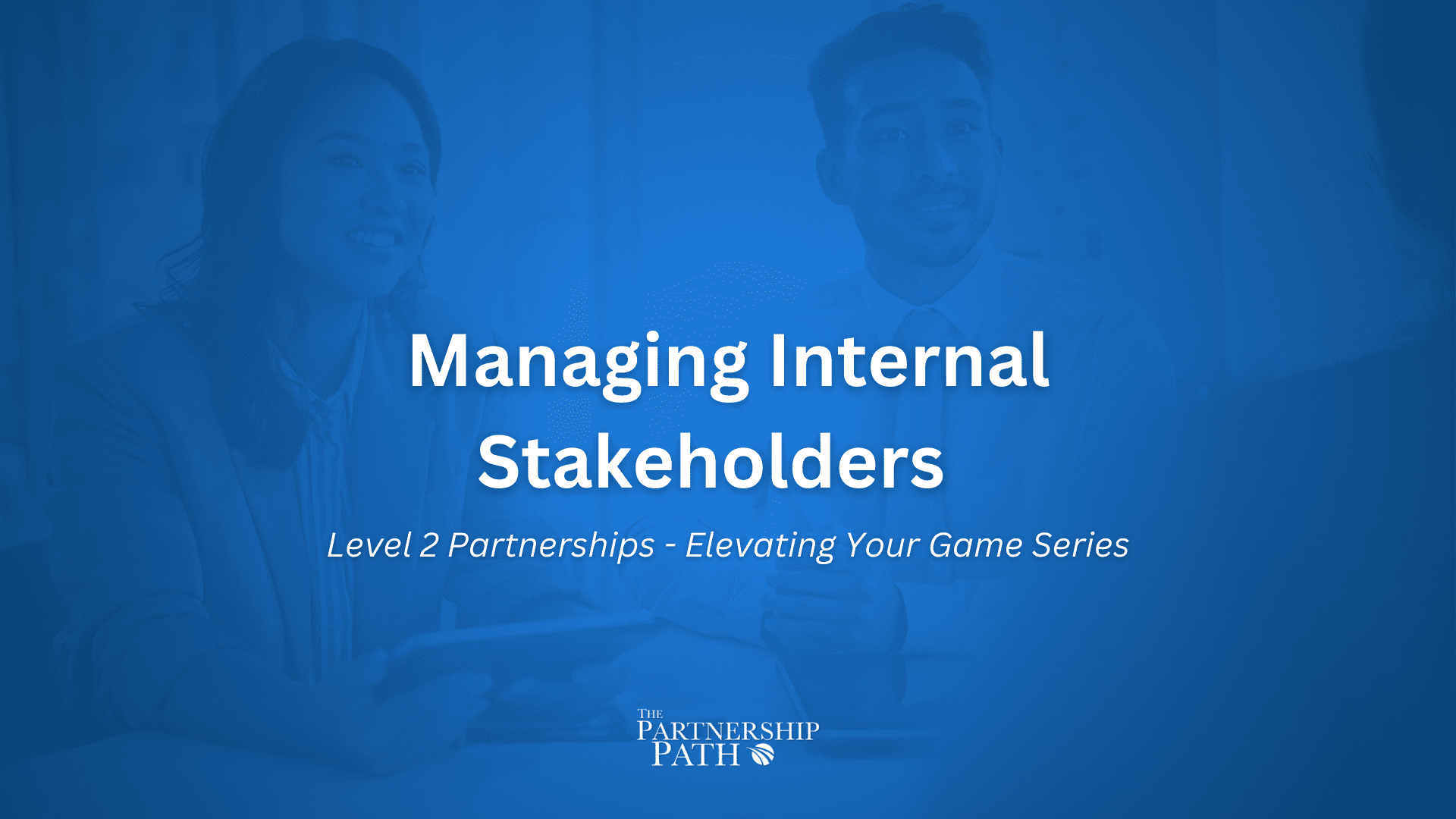IRL Episode
Managing Internal Stakeholders with Michael Del Sarto at iLink
Episode Summary
In the world of partnerships, understanding how to manage internal stakeholders is crucial for success. In this episode of The Partnership Path in Real Life, John Rudow welcomes Michael Del Sarto, a seasoned expert with 25 years of experience in the Microsoft partner ecosystem.
Their conversation delves into essential strategies for effectively communicating with internal executives, the importance of emotional intelligence (EQ), and the nuances of building strong partnerships.
Sharing this video is valuable for anyone looking to enhance their skills in partnership management, as it provides real-world insights from someone who has navigated the complexities of internal and external stakeholder relationships.
Transcript
John (00:01)
Well, hello everybody and welcome to another episode of the Partnership Path in Real Life. Michael, I’m super excited to have you on the show today. You and I have been talking about this podcast for a very long time. And so I’m just, I’m thrilled to have you on. But before we get going, let me let you introduce yourself to our listening audience. Tell us a little bit about who you are, what you do, and how long you’ve been working with partners.
Michael (00:25)
Sure, thanks, John. And yeah, I really appreciate the opportunity to do this with you. We’ve been talking about it and it’s like that today is here. So just a quick, a little bit about me. 25-ish years in the partner world, all of that around the Microsoft ecosystem, either on the inside of Microsoft, you know, in partnering or on the outside as I am today as an Alliance lead back into Microsoft. Yeah.
John (00:50)
Nice, all
right, 25 years, man. That’s a lot of good experience. I like that.
Michael (00:55)
It adds up, and thankfully, eventually.
John (00:56)
Neither one of us are old
enough to actually have 25 years of experience, but hey, whatever. All right. So listen, we wanted to have you on to talk about the episode that Tony and I just recorded. I know you listened to it. We talked about this managing internal stakeholders idea. And so let me just open it up. You listened to the episode. Tell me, you know, what resonated for you? What’d you think? How do you respond to that episode?
Michael (01:27)
You know, there were so many points in there that you guys made that I would call out. You know, one of them was a book of business and just sort of like having that sense of in the partnership, how important are you to the partner? How important is the partner to you? Right. And understand and, you know, and understanding that it’s an important one to as you go to build that partnership, like what can you expect and why can you expect that? Well, you’re super important. OK. You know, understanding that.
John (01:55)
Right.
Right.
Michael (01:57)
Putting yourself in the shoes of whomever it is from an internal stakeholder perspective, like your CEO, your CRO, the partners, the folks over in the partner side. Being able to put like this probably just hits straight to the heart of EQ, right? Putting yourself in somebody else’s shoes is so valuable. That took me a long time to learn over the years, but it really makes a difference when you can do that.
John (02:09)
Yeah.
That’s right. Yeah.
Michael (02:25)
And there’s another one I thought that you mentioned, which really struck me as so true, which is the execs in your, if you’re in the partner, you’re the partner, right? Your execs, they’re not all knowing. Maybe you think they are, especially if you’re younger in career, that they are, they’re where they are because they know everything, right? It’s not so much that. They may know a little about the partnership. They may know a lot about the partnership.
John (02:36)
Yep. Yep.
Right.
Michael (02:54)
You may have talked with that CEO or CRO two weeks ago or a month ago about a very topic and they’ve come back to you a month later, a couple of weeks later. And it’s like that conversation didn’t happen, but they’ve got so much going on in their world. Like you’re a part of their world, but there’s so much going on. And just because they’re execs doesn’t make them impervious or infallible. So that I think also speaks to the EQ bit, right? Which is, as you’re thinking about your internal stakeholders,
John (03:07)
Yeah, that’s right. That’s right.
Yeah, yeah, for sure.
Michael (03:24)
external as well, like there’s a lot of people bits to this, right? There’s just a lot of people bits to this.
John (03:28)
Yeah. Yeah.
Yeah, man, I love that point, Michael. This the as a business owner myself, right? I don’t know that I really ever appreciated the executives that I worked for, how many different things that they were dealing with at the same time until I was in that role. Right. I mean, I have people on my own organization where I’m kind of, sometimes I’m like, hey, I know we talked about this, but I don’t remember what
Michael (03:49)
Yeah. Yeah.
John (04:00)
where we landed on it because it wasn’t that important to me at that time, right? And so, you know, that appreciation of, I need to remember this person has a lot going on and I’ve got to kind of try and meet them where they’re at and remind them of maybe something that happened in the past that’s really critical.
Michael (04:19)
It is, yeah. And you as the partner person, those execs, they appreciate it when you can meet them where they are. And in that way, you’re not forcing them to remember everything. They’re counting on you to do all that, to remember all that. And then touch points with them, just bring them back up to speed. So yeah, there was a lot, thought, in that session that you guys did, which was, I got four of the things I wrote down, but I won’t go into them all.
John (04:47)
No, no, keep going. That’s fine. Whatever.
You know, this is about you, you know, kind of coming on and telling us a little bit about, you know, how it works for you. Like, so let’s go there. Are there some of the things in the episode that that you think, hey, I’ve done that or I would do that a little differently or, you know, what about some of that? Like, I know you’ve had some of these issues. You and I have talked about some of this before of how do I
Michael (04:56)
Yeah. Okay.
yeah, sure.
John (05:14)
How do I get my exec to understand the reality of this partnership?
Michael (05:20)
Yeah, I think it’s good as a partner, let’s call it a partner person, somebody in this career. There’s a few things I like to think about when I sort of assess that partnership from both sides, right? Which is, what’s the priority of that partnership to the business, to your business, to their business, right? Where do you stand? And by the way, there may be four or five other partnerships that are going on that are part of that, part of your company, right? Where are you both?
John (05:38)
Yeah, right, right.
Michael (05:49)
in relation to the partner, but also in the portfolio of your company. Have a good sense of that. I’ve got a few more here. So what’s your leadership’s team or what’s your company’s, more broadly even, experience with that partner? And you probably had this as well, as you get a sense of where that partner is, how important that partner is to you, how to influence your internal stakeholders.
John (05:53)
That’s right.
Yeah.
Michael (06:17)
how much experience do your stakeholders have with that partner, right? Because you know what it’s like on the inside of whether it’s, you know, any one of the hyperscalers, they got their own way of, there’s a lot of similarities, but they got their own way of doing things. And if an exec has experience or somebody else, you know, one of your stakeholders has experience with that partner, great, that’s super helpful. You can, that can be very influential and someone that you can, you know, leverage in fact. But if they don’t, which a lot of like, you know,
John (06:20)
Yeah.
For sure. Yeah.
Michael (06:45)
people inside a company, the sellers, the marketing team, probably a lot of them have never really worked with one of the hyperscalers or one of the your partner. So it’s another consideration. I think also I like to think about what are the drivers, let’s say to the leadership team, what are the drivers for this partnership? Right. And of course, it’s revenue, you know, as often as it is not, it could be market sort of awareness. trying to build up your cache in that way. But let’s call it let’s say it’s revenue. But there’s something more to it than revenue, which is
John (07:14)
Yeah.
Michael (07:15)
We’re trying to exit. We’re trying to go public. We’re trying to go private. And that partnership quite often, especially with the larger, with the hyperscalers, can be super meaningful. And so it’s not just that revenue, but it’s understanding. And that can be understanding what the higher order is that’s driving this partnership or the reason for being.
John (07:21)
Yeah. Yeah.
Yeah.
Yeah. You’re, you’re, well, you’re, you’re keying in on, why sometimes these tactical conversations that we have with executives can feel so emotional, right? Because they haven’t necessarily shared with you what their real agenda is because it’s not even appropriate for them to share it with you. But man, you know, sometimes as the
Michael (07:39)
Yeah, sorry, go ahead.
Yes. Yes.
Maybe not.
Mm-hmm.
Mm-hmm.
John (08:06)
Alliance guy or whatever you walk away from one of those conversations being like Man, that was that was brutal. Like like my own exec was really upset about the fact that we couldn’t get whatever Because we don’t know the big picture. We don’t know what what that’s really a part of for those execs. Yeah
Michael (08:18)
Right.
sure. That could have been something as current as they had a board meeting the day before, right? And the board’s got the pressure on not about the partnership, but about the business and where they want to take that. so yeah, I think that’s another one alignment with a partner, like, do you feel like you guys are on on the same page, right? And there’s a whole probably episode or episodes you could do on how to achieve that. But let’s just say it’s as simple as are we aligned on that metric, that revenue metric, that whatever metric
John (08:35)
That’s right.
You
Michael (08:55)
Do you have that as you’re assessing this? And then I also think leadership, the leadership EQ can be a big one as well. Like what kind of leaders do you have? What kind of personality is that leadership team? Is it aggressive? Is it growth mindset? Is it whatever? And understanding that when you’re trying to influence and stakeholders internally and externally. And then this probably ties back to the one in my head. This probably ties back to the one who’s like, what’s the driver for the partnership?
John (09:04)
Yeah. Yeah.
Michael (09:24)
How fast does that partnership need to move? How fast does it need to deliver results from, maybe it’s a new partnership. A lot of the ones I’ve been involved with have tended to be more new and they’ve got an 18 month runway to really produce because that 18 months is when they, here’s why we had this partnership to begin with, to get acquired, to do whatever. So there’s a lot, think that in my mind,
sort of adds up to what you need to know to be able to effectively influence your leaders, effectively influence the folks that maybe you work with more on a day to day, the sellers, the sales managers, whatever. I tend to try and, I guess as I’ve gone sort of further in career, those things start to raise up to the top. Yeah, it’s about rolling up your sleeves and doing good work every day. Like be in the machine that really drives and delivers.
But there’s also this like, it’s people, it’s a people business, it’s always a relationship business. And there’s these factors that you just don’t know. And there’s factors that you try and like keep be alert to, like try to pick up signals. And they will serve you really well in influencing folks internally and at the partner.
John (10:28)
Right.
Right. Right.
for sure.
What’s your advice, Michael, to a younger in career channel person, alliance manager, partner development manager, whatever the title? What’s your advice to them in terms of asking those questions, right? because, you know, on the surface, you want to say, you know, just ask your exec, hey, what, why does this matter so much? What, you know,
Help me understand the emotion behind that or whatever. Like, what’s your advice to somebody who’s maybe a little younger in career as to how okay is it to ask those questions? Like, would you encourage them to do that or not?
Michael (11:20)
That’s
a tough one. I’d love to say yes, I’d encourage them to do that. But part of the answer has got to be like, well, what’s the leadership EQ? You have a sense of the personality of your company, right? Or your leadership. But I would say that these questions are all pretty fair game to ask. If not, your manager or one of the leaders, especially on these bigger partnerships, these things can be super meaningful.
John (11:32)
Yeah. Right. Yeah.
Yeah. Yeah.
Michael (11:50)
So pick in your moment, being super brief, sort of punchy about your question or your ask. But I think it’s fair to, I think there’s a fair questions to ask folks like, hey, why are we, like, what’s the main driver here? And some of these things should become very obvious, like it’s revenue, but the, we need this for an exit. You’re gonna have to intuit that, like that isn’t necessarily something that’s gonna be spoken.
John (12:06)
Yeah. Yeah. Yeah.
Yeah.
Yeah. Yeah. mean, obviously, I don’t think they can necessarily, they’re not going to be able to tell you that detail, but they might be able to say, hey, look, there is a bigger picture here. This partnership is super important that we achieve a particular revenue level in a certain amount of time to help us achieve our longer term strategic goals. They could say, they could be a little bit more generic, but I…
Michael (12:22)
Mmm.
Mmm.
Yes.
John (12:44)
I would agree with you. think I would lean towards ask the question, but to your point, pay attention to the EQ and then make sure you’re asking it with a lack of emotion on your own side, right? Because if you go in with that question of, you know, you kind of hurt my feelings, why is that so, right? Like it’s all about checking yourself at the door and coming in for a business conversation with that exec to say, Hey, I want to make sure that I’m.
moving my partnership in the right direction for the company. So help me understand what’s behind this, right? I think that’s a fair question to ask, which probably got to practice asking it.
Michael (13:21)
You know, it’s probably the thing that took me the longest to learn. And maybe I’ve finally learned it right here towards, you as I’m 25 years in, but the professionalism that you bring and the lack of emotion that, and I mean that not in like, you know, I’m just a robot, but in knowing yourself, right? And knowing maybe your first instinct is to react, right? And to not do that. And I know this becomes very like, let’s, you know, let’s meditate on this, but
John (13:30)
You
Michael (13:52)
that it’s not a bad idea. Knowing yourself and checking your emotion and being super professional, that goes a really long way with execs regardless. For sure in this kind of question. But as much as we like to think that they’re not paying attention, the execs, they’re paying attention, they will notice the emotional response.
John (14:02)
Yeah. Yeah.
for sure.
For sure. Yeah. Yeah.
Michael (14:18)
versus the controlled response, if you will, for
me, for lack of a better word. it’s probably when one of the, like I’m more of a doer and a person that sort of like is ready to go. And it’s hard to, it’s taken a long time for me to get to that place where can check the emotion and come in with a pro, you know, sort of pro mindset. And part of that’s also just a patience thing. as a channel person,
John (14:44)
for sure.
Michael (14:46)
The execs will say the same thing ultimately about any partnership. It always takes longer than you think it’s gonna take. And it does, right? Like we want it to go as fast as possible, but it always takes longer. And so there’s a patience element in there as you, even as you just go to ask that kind of question. And it’s very, maybe there’s a lot of psychology in this, but yeah.
John (14:51)
Yeah, yeah, yeah.
For sure,
ton of psychology. mean, look, this is a theme throughout everything that we do around partnerships. Ultimately, it’s a sales job. this idea of managing internal stakeholders is about selling your internal stakeholders on a particular idea, concept, action, right? It’s always a sales job. And as soon as you…
Michael (15:14)
Mmm.
Mm.
John (15:32)
forget that, that’s when start making mistakes. That’s when you start, you know, it’s all psychology for sure.
Michael (15:35)
Totally. Yeah.
Yeah, the sales part of it is super fun too, because as you start to influence people, as the business and the partnership starts to have some success, you can do that even more, people start to understand like, oh, okay, I got it even more so. It’s like, I know how to interact with that partner salespeople now. And I understand that it’s knocking down their quota when we do this together, and it’s knocking down mine. And as you start to get those champs internally.
it becomes a lot easier to influence internally, including the exacts, right? They’ll start saying, yeah, I get it now. we’re, you as obvious as knocking down their quota is to why the partnership’s successful, seeing it, that’s the, you know, that’s part of that is the sales process and part of that is selling internally. Yeah, it’s super fun to see and be part of. Yeah.
John (16:15)
for sure.
Yeah, for sure. Yeah.
for sure and be part of that’s right. That’s right.
Look, Michael, we try and keep these episodes nice and short so people can, you know, listen to them on their commute or while they’re walking or whatever. So we’re at time, but I want to give you one last chance. I know you took a, you said you had a bunch of stuff written down. So take a quick look at your notes. there, is there any last thing that you want to kind of throw out there as advice to somebody on, you know, Hey, and don’t forget about this or
Michael (16:44)
Okay.
John (16:58)
Whatever, any last thing, any last words of wisdom you would give to someone who doesn’t have 25 years of experience?
Michael (17:04)
I think we touched on a couple, I’ll just reiterate them. One is, the exec says as much as we like to think, especially when we’re younger in career, that they know everything and that defer to them, like, they don’t and they’ll admit it. as often as not, they may even say that and expect you to come to them with things that they don’t know and to challenge them, right? Respectfully. And that leads to the second point which I would emphasize, which is always,
John (17:16)
Yeah.
Yeah. Yeah.
Yeah. Yeah.
Right, yeah.
Michael (17:32)
Always come pro, always come professional, always check your emotion. So easy to say. Like I’m saying it like if anybody’s listening to this new me 20 years ago, they’re like, who are you? All right. Like what? Thank you, John.
John (17:38)
Yeah, a lot harder to do. Yeah.
sure, for sure. You and me both, man. You and me both. Michael, thank you so much for coming on this episode with us. I appreciate
it. I hope we can have you come back again sometime. Thanks.
Michael (17:55)
I’d love to. Thank you so much.
Bye.
Key Takeaways
- Emotional Intelligence Matters: Understanding the emotional landscape of your stakeholders can significantly influence partnership dynamics.
- Executive Engagement: Recognize that executives may not remember all details; it’s key to meet them where they are and provide timely reminders.
- Partnership Prioritization: Assess the strategic importance of your partnership and align it with executive priorities to foster support.



